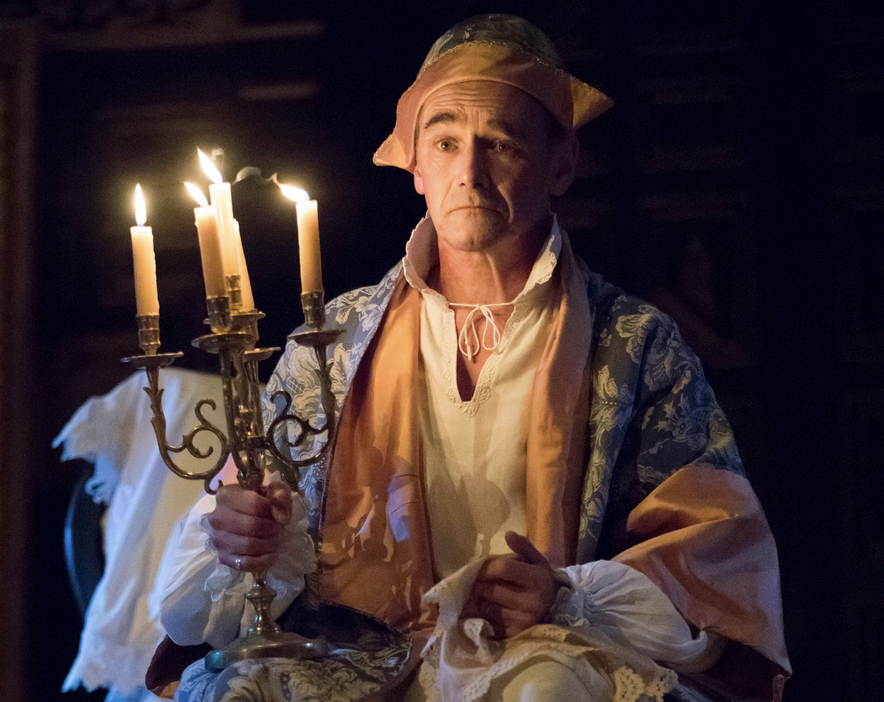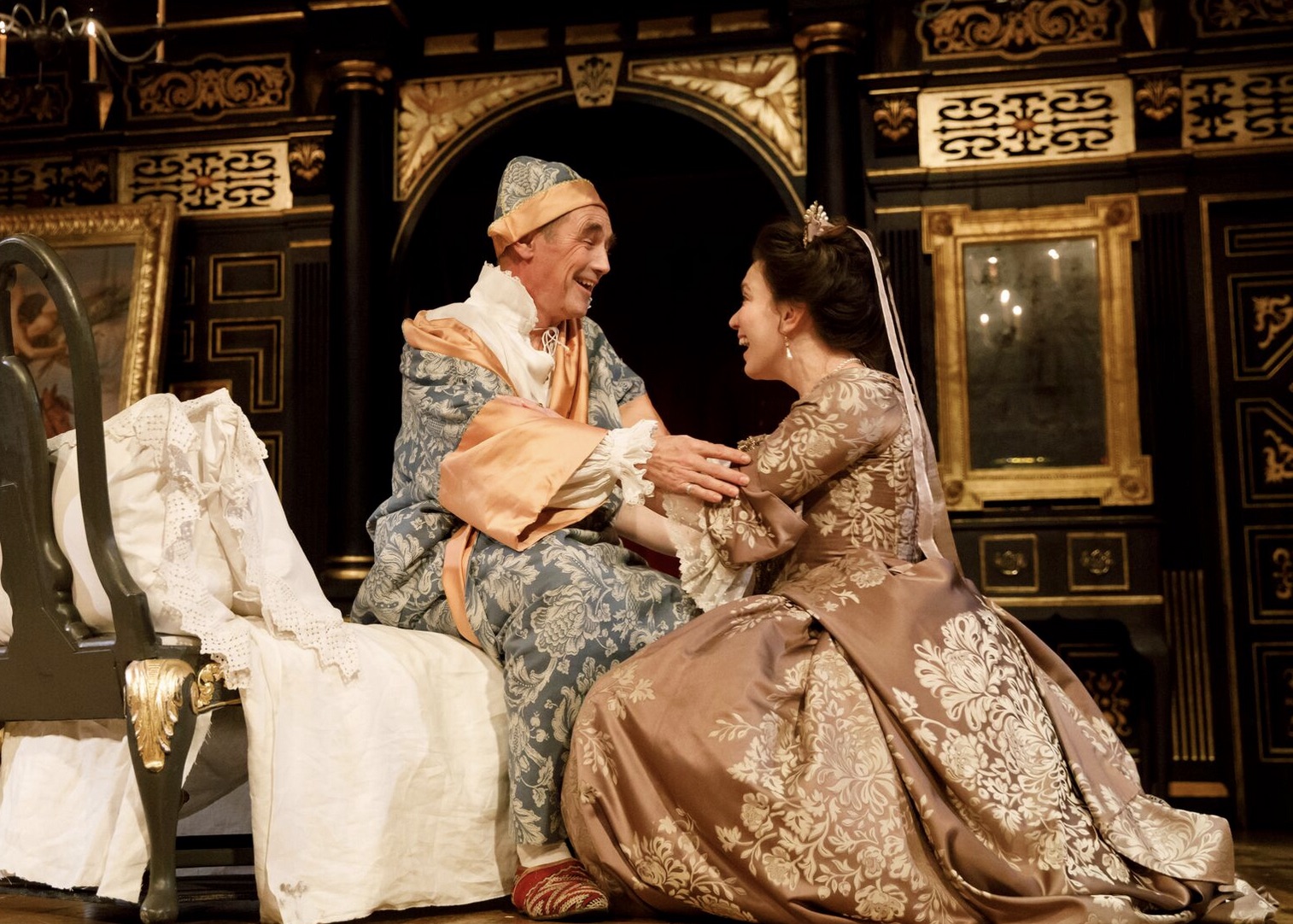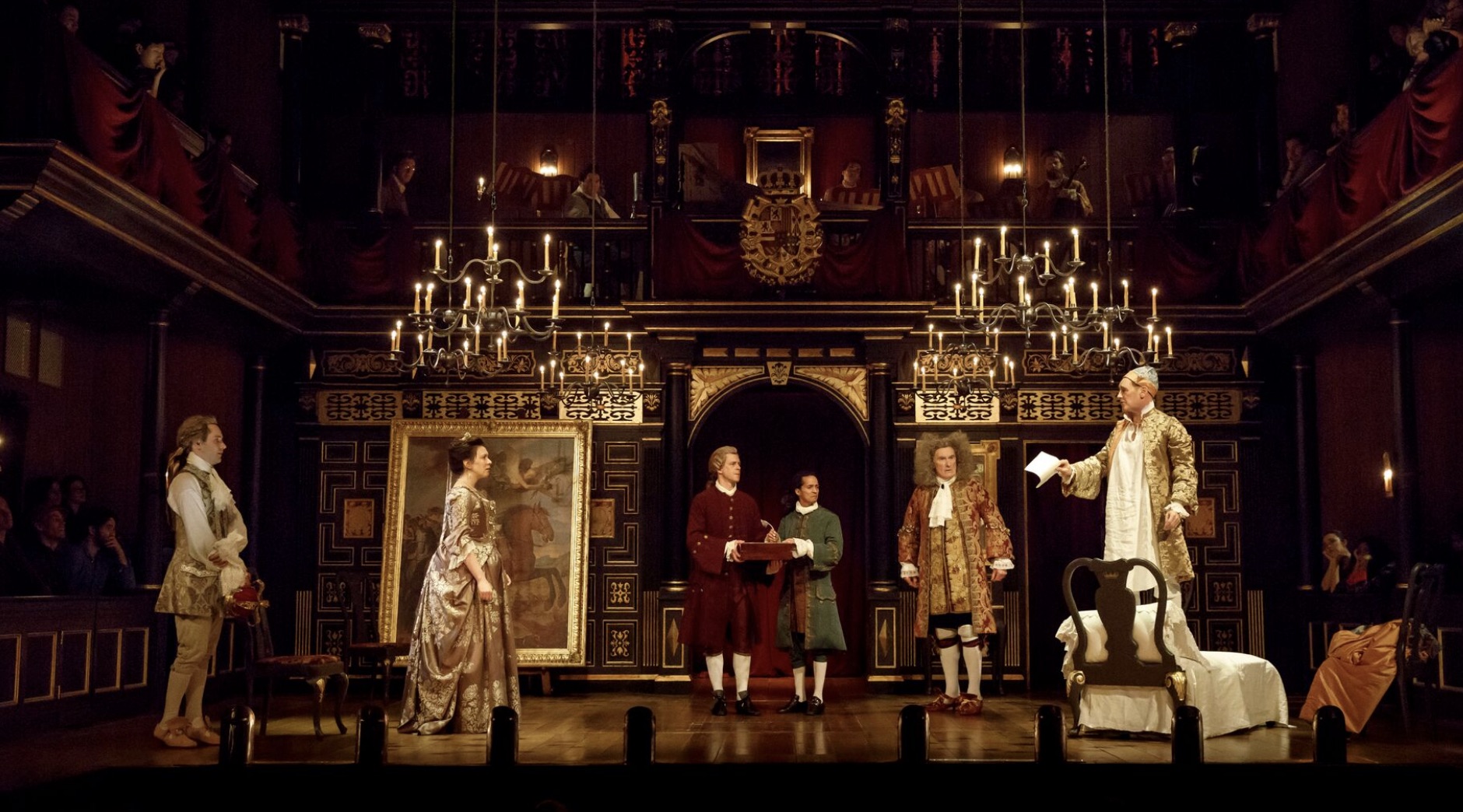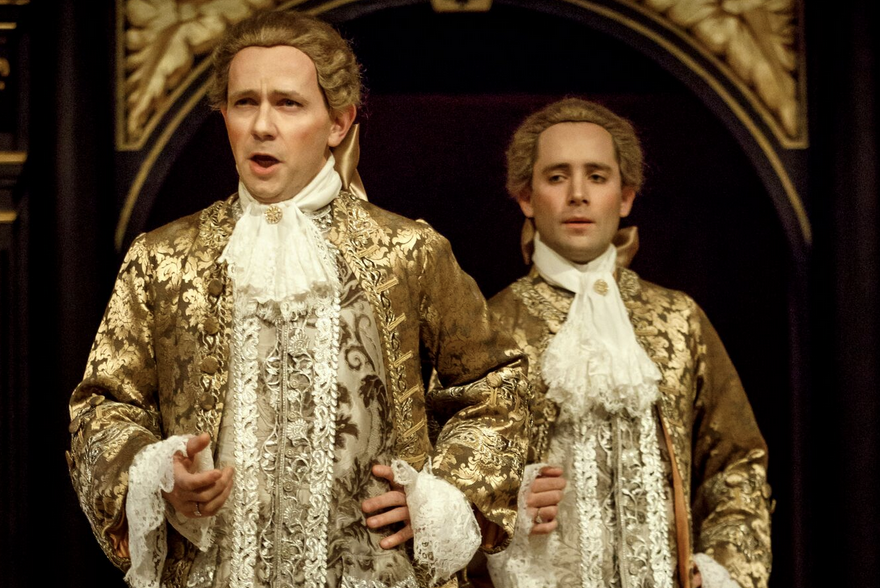Belasco Theatre, New York
December 17, 2017
From Nebuchadnezzar to Nero, from King Lear to King George, dramatists across the centuries have drawn inspiration from the mental instability of monarchs. Now it’s the turn of King Philippe V of Spain in Claire van Kampen’s engaging new play, which arrives on Broadway fresh from Shakespeare’s Globe in John Dove’s visually sumptuous production. Not only does van Kampen’s gentle exploration of identity, responsibility, sanity and perception turn out to be one of the more profound historical plays of recent years, it also gives audiences a chance to bask for two-and-a-half hours in the dramatic talents of Mr van Kampen (aka actor Mark Rylance) and the vocal beauties of Iestyn Davies, one of the world’s finest countertenors.
 Mark Rylance in Farinelli and the King. Photo © Joan Marcus
Mark Rylance in Farinelli and the King. Photo © Joan Marcus
For the final nine years of his life, his increasingly erratic behaviour and debilitating depressions were soothed by the musical ministrations of the famous castrato Carlo Broschi, aka Farinelli. But what was it compelled the greatest star in the operatic firmament to retire from public performance at the very pinnacle of his fame? And how did the 32-year-old singer hold his own at the Spanish court for 22 years? One way or the other, it would appear that the eight or nine arias Farinelli used to sing every night for the king and queen constitute one of the earliest documented examples of music therapy.
Van Kampen begins her tale with the king (Rylance, magnetic as ever) wheeled in on a daybed, mentally at sea while fishing for and conversing with a goldfish. His second wife Queen Isabella (a warmly determined if slightly stagey Melody Grove) believes that only music hath the necessary charms to soothe this savage breast and so, in one of the script’s flights of poetic license, she travels semi-incognito to London. There she visits the King’s Theatre where Farinelli is the star attraction of John Rich’s Opera of the Nobility (the rival company to Handel’s). Arriving back in Spain with her prize, the King is immediately enraptured by the great castrato, cleverly depicted by the actor Sam Crane as a subtle and vulnerable artist, while aided and abetted by the ravishing tones of the rather more flamboyant Iestyn Davies.
 Mark Rylance and Melody Groves in Farinelli and the King. Photo © Joan Marcus
Mark Rylance and Melody Groves in Farinelli and the King. Photo © Joan Marcus
Foiling a scheme to force his abdication by his stuffed shirt of a First Minister Don Sebastián de la Cuadra, Philippe ups sticks and transplants the royal household along with his human songbird to an Arcadian retreat. There he hopes to learn the secret of Pythagoras’s ‘music of the spheres’ but the pull of unbuttoned nature forces each member of this curious ménage to reflect on a lot more than ancient Greek philosophy.
For Broadway, Jonathan Fensom’s recreation of the Globe’s Sam Wanamaker Playhouse – itself based on the famous indoor Blackfriars Theatre where Shakespeare and the King’s Men played their winter seasons – is a work of art fit to rival a Velázquez. Rich in dark woods and gilding, it is breathtakingly illuminated by Paul Russell’s seemingly all-natural candlelight design allowing much effective play of shadows but without missing a single detail. Festooned chandeliers rise and fall, footlights are lit with tapers before our very eyes and much use is made of the kind of stage machinery typical of the operatic extravaganzas of the time. It’s an absolute feast for the eyes, complemented by the feast for the ears provided by a mix of seven British and American musicians. Led from the harpsichord by Robert Howarth, the line-up includes such luminaries of period performance as the Avison Ensemble’s Pavlo Beznosiuk alongside players who regularly grace the likes of the Academy of Ancient Music, Orchestra of the Age of Enlightenment or Apollo’s Fire.
 The Company in Farinelli and the King. Photo © Joan Marcus
The Company in Farinelli and the King. Photo © Joan Marcus
Always a draw-card, Rylance confirms his status here as one of the great actors of our time. His natural delivery, each word apparently plucked from out the air a second before it is required, belies a formidable vocal technique. Whether drifting off into his private dream world or ranting at his unfortunate spouse, not a syllable fails to register in a bravura and deceptively effortless performance. A master of emotional volatility, Rylance’s frequently childlike ruler wrestles with distress, a bemused charm and lusty good humour ameliorating the occasional outbreak of monarchical potty-mouth.
The most intriguing scenes are those between the initially sceptical but soon besotted Philippe and the equally wary Farinelli. Crane puts in a touching performance, playing down the singer’s reputation for gaudy plumage and revealing a man ashamed of his bad teeth and still smarting from the time he was castrated age 10 by his brother, the composer Riccardo Broschi (or “Rich the Knife” as Rylance jokingly refers to him in passing). “Are you famous?” asks the king. “No, Farinelli is famous,” comes the reply. Philippe, forced to ascend the throne of a foreign country the language of which he didn’t speak, feels similarly fake; no more than a figurehead. Farinelli and the King is as much a play about the burden of responsibility and the yearning to lay down the mantle – be you King of Spain or King of the Castrati – as anything else. For his part, Farinelli is increasingly attracted to his royal audience of one who, he says, seems to lean closer and closer in to attend the music making.
Sam Crane in Farinelli and the King. Photo © Joan Marcus
If Grove’s Queen Isabella feels somewhat less defined, maybe that’s because – despite her status as political outsider – such concerns are not hers. Nevertheless, as she comes to feel for both her husband and her ‘songbird’, the character and the actor develop an increasing depth to ultimately win our sympathy.
As Philippe’s irascible, harrumphing and gloriously bewigged Prime minister, Edward Peel could have stepped straight out of a Hogarth, a hint of northern dialect conveying a Philistine tendency that prefers a good Christian bullfight to namby-pamby opera. Colin Hurley plays the likable John Rich (the producer of John Gay’s Beggar’s Opera that reportedly “made Gay rich and Rich gay”) as a straight talking, cynical cockney, world weary and well over opera singers (or that “bunch of tossers,” as he calls them). Philippe’s personal doctor José Cervi, a man opposed to old-fashioned methods like bleeding, should be a compelling character, but van Kampen loses interest in him early on and there is little that an unassuming Huss Garbiya can do to engage our attention.

Iestyn Davies and Sam Crane in Farinelli and the King. Photo © Joan Marcus
And what of Iestyn Davies? Dove’s production uses him sparingly yet to maximum effect, whether discreetly shadowing his stage doppelganger as he caresses the long lines of Porpora’s Alto Giove, expressing Farinelli’s developing love for the Queen in a smooth-as-silk Cara sposa, or descending from the flies like a baroque Deus ex Machina tossing off the roulades of Sento la gioia. Davies may be a male alto (as opposed to Farinelli’s reported high soprano), but who cares when the singing is this good. His final Lascia, ch’io pianga would make stones weep.
If at times Farinelli and the King seems so full of ideas it must burst, the final scenes pulls matters together skilfully. As the elderly singer considers a request to return to London, van Kampen posits a couple of questions that stay with you as you leave the theatre: from the point of view of music therapy, did Farinelli’s voice ultimately fulfil the King, or did it simply drive the other voices away for a time? And what of John Rich’s democratic dream that for the price of an orange, opera might be enjoyed by princes and road menders alike? If the cost of opera these days seems to put it beyond the reach of the artisan, at least Farinelli and the King can work its magic and banish those discordant voices for a while.
Farinelli and the King is at Belasco Theatre, 111 West 44th Street until March 25, 2018











Comments
Log in to join the conversation.